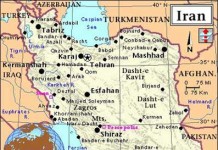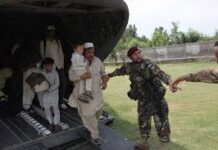Context
 By Jehangir Khattak
By Jehangir Khattak
The release of former Taliban second-in-command Mullah Abdul Ghani Baradar by Pakistan may have heightened the expectations of peace in Islamabad and Kabul. But the news media of Pakistan and Afghanistan are skeptical about the impact of his release.
Pakistan released the Mullah, in his 40s, on Saturday, September 21, on the eve of Prime Minister Nawaz Sharif’s visit to the United States. Many are interpreting the timing of Baradar’s release, a long-time demand of Afghan President Hamid Karzai, as an attempt by Islamabad to show to the world its seriousness in finding a political settlement to the Afghan imbroglio.
In the Afghan capital, President Karzai’s spokesman Aimal Faizi sounded upbeat. He called Baradar as an influential person who would help boost Kabul’s stalled peace initiative. He said, “Our first demand is that he should come to Afghanistan to meet his compatriots,” adding: if he did not want to return home, the released militant leader should go to a ‘secure place’ where Afghanistan’s High Peace Council (a body of the Afghanistan peace and reintegration program) members could approach him.
Analysis
Review
American and Pakistani agents picked Mullah Baradar in January 2010 from the southern port city of Karachi. His arrest invited strong reaction from Karzai who called it an attempt to derail negotiations between his government and the Taliban.
Many newspapers in Pakistan and Afghanistan while acknowledging it to be a significant development, if not a milestone, sounded very cautious about an impact that Baradar could create on the security environment in Afghanistan.
Public opinion in Pakistan also exhibited such caution. A public opinion poll conducted by The Nation, a leading conservative Pakistani English daily, found Pakistani public divided on an impact of Baradar’s release on security situation in Afghanistan and Pakistan.
Only 32% of the respondents thought that Baradar’s release would help Afghan reconciliation process, while 33% thought his release would strengthen the Taliban in the post-war Afghanistan. As for impact on Pakistan, 35% of the respondent thought it would harm Pakistan’s security.
Beradar’s release despite all its significance may or may not have much impact on the peace process. It’s too early to make an opinion on its real impact on the insurgency dynamics in Afghanistan and its spillover into Pakistan.
However, after having been away from the Taliban’s active cadres for years, many analysts are questioning Baradar’s influence on its reclusive one-eyed leader Mullah Mohammad Umar.
Some analysts believe that his influence in the Taliban might have waned over the years. James Fergusson, a freelance journalist and author who has covered events around the world, especially in Central Asia and Afghanistan, is one such pessimist who believes that Baradar might have lost much of his influence.
“He’s been locked up for nearly three years now. Things have moved on a great deal. But it is certain that Pakistan, by releasing Mullah Baradar, is hoping that he still does have some influence. This looks very much to me like Pakistan’s play to try and make sure that they have a hand in the negotiations,” she told Radio Free Afghanistan in an interview.
Pakistani Media
But many in Pakistani media do not agree with Fergusson. The News International, one of Pakistan’s leading English language dailies, in an editorial said Baradar’s release will have a strong bearing on the future course of Afghanistan. It said Baradar could pave the way for a negotiated settlement of the Afghan conundrum, should he join the peace negotiations.
But he could risk re-arrest if he doesn’t join negotiations and instead decides to stay with his family in Karachi, from where he was taken into custody.
“Baradar’s release is only the first small step towards better relations; for now Afghanistan still believes that Pakistan hopes to use the Taliban as a proxy with which to control the war-torn country. History gives them reason to harbor such suspicions.”
The editorial also takes note of Baradar’s non-release to Afghanistan with disdain.
That we didn’t hand over Baradar straight to Afghanistan is probably a sign of our conflicting agendas, or multiple tactical and strategic options, so to say. It is time we committed wholeheartedly to peace in Afghanistan rather than slip back into our old and failed policies that hurt the country without making us any more secure.
In its September 22 editorial, Pakistan’s oldest English daily Dawn noted the Baradar’s release was long-standing demand of President Karzai and termed it as a “minor milestone, if not a miracle of some sort.”
The change in tone may be linked to the inescapable fact that time for a post-2014 Afghan settlement is running out quickly, or a late-stage maturity on both sides. Whatever the reason, it should be encouraged. For Pakistan, it is essential that the political leadership involve itself in critical foreign relations.
However, it does not expect too much from the reconciliation process even after the release of Baradar.
Time is short, in particular for President Karzai, whose successor’s election process will kick off shortly and culminate with a vote in April, and it’s unclear what if anything can be concretely achieved on the reconciliation front before next year, and perhaps even after.
It also notes that release of Taliban prisoners has so far not helped to push forward the Afghan peace process either. Pakistan has so far released 33 Taliban leaders and none of them have joined the peace process. It also notes that release of Taliban leaders is not the only source of friction between Islamabad and Kabul. Rather cross-border attacks on each side will also continue to sour their relations.
In its editorial, another national daily Pakistan Today also adopts a cautious approach of wait-and-see for possible payoffs from the release. It says that while negotiations between Kabul and Afghan Taliban and Pakistan and Tehrik-e-Taliban Pakistan (TTP) are two separate possibilities, but these are equally daunting challenges for Islamabad.
“Whether the release would bring the warring sides together to evolve an Afghan-owned, Afghan-led political solution remains to be seen.”
It also expresses pessimism about the success of any negotiations between the TTP, who publicly owe their allegiance to Mullah Omar, and the government of Prime Minister Nawaz Sharif. It says none of the sides have so far named any negotiators’ teams nor the Taliban have stopped their terrorism. Pakistan’s supposedly saner political minds while elevating the Taliban to the position of “stakeholders” in Pakistan’s efforts to end terrorism, never formally set cessation of Taliban attacks as a precondition for any talks.
Afghan Media
In neighboring Afghanistan, Mullah Baradar’s release received warm response from the government while newspapers and commentators expressed their reservations about the outcome of a dialogue facilitated by him.
In an editorial, Afghanistan’s influential English language daily Outlook Afghanistan lowered the expectations bar even after Baradar’s release. It attributed several reasons for its pessimism, especially questioning Taliban’s seriousness for peace.
“The talks of peace and reconciliation process to them are a game that they are playing so as to have a good bargain. It is difficult to believe that Taliban will ultimately settle for a political solution and will adhere to their promises of maintaining peace and tranquility in the country once they are given a share in the political authority sharing. And now as they see the withdrawal process to be completed soon, they prefer not to have peace talks at all and win a larger share through war.”
Not just that, the editorial says there are concerns over the strings attached by the HPC for the peace talks. The HPC is asking the Taliban to accept its preconditions before talks can be started. The conditions demand that the Taliban must respect the constitution of Afghanistan; give up violence and respect the human rights, especially the rights of women.
“However, it is difficult to presume that Taliban would respect those conditions eagerly. Moreover, the growing distrust among the parties on the other side of the process has made the Taliban take advantage of the situation and they have already started dictating their own conditions.
One of the most important factors in reaching to any conclusion regarding reconciliation is that both Afghanistan and Pakistan need to realize that terrorism has been affecting both the countries; both of them have to realize the importance of each other and have to understand that they cannot solve the issue individually. Rise of terrorism and discontent in one country will definitely affect the other and vice versa. Therefore, joint efforts would be required and both the countries can start from this opportunity in hand.”
In a separate editorial comment, Afghanistan Times, raises some tough questions surrounding Baradar’s release and for which few people have an answer at this stage. It says given the timing, Baradar’s release could be the “biggest game changer.” However, the way the former Taliban honcho has been released has made many people uncomfortable in Kabul and even in Pakistan. Afghanistan Times sees a “cloud of uncertainty and confusion” around the Mullah’s release, which it says may reduce it to a non-breakthrough.
He was released inside Pakistan and not handed over to the government of Afghanistan. Prior to his release, hundreds of prisoners were handed over to Kabul. The Afghan government released them all, but why didn’t Islamabad hand Mullah Baradar over to Kabul is a question that raises many eyebrows. Since Mullah Baradar had been the chief of Quetta Shura therefore it is natural he will go back to Quetta. After that he will become address-less and none will have the clue about his whereabouts.
If such a thing takes place what is the meaning of his release? Whether his release will be a major breakthrough or it will be just another step taken in a wrong direction? The future will decide about it. But given that High Peace Council’s officials have access to Baradar then yes we can say without naysay that it is a major breakthrough and if he remains underground then his release is nothing but an attempt of hurling dust into the eyes of Afghanistan and the international community.
It asks Pakistan’s spy service the Inter-Service Intelligence (ISI) to keep an eye on Baradar during his freedom and share such information with Kabul.
If Islamabad doesn’t support Kabul in this regard, his release will turn out to be a leap in the dark.
Born in the southern Afghan province of Uruzgan, Baradar fought in the war — covertly backed by the US and Pakistan — to expel Soviet troops from Afghanistan in the 1980s.
When the Taliban rose to power in 1996, Baradar’s friendship with Mullah Omar made him deputy defense minister. He fled to Pakistan after the Taliban government was toppled by the US-led invasion in 2001.
 The writer is a Senior Editor at the voicesofny.org, a news portal of Graduate School of Journalism at City University of New York. Tweets @JehangirKhattak. Article published courtesy of ViewsWeek.
The writer is a Senior Editor at the voicesofny.org, a news portal of Graduate School of Journalism at City University of New York. Tweets @JehangirKhattak. Article published courtesy of ViewsWeek.



